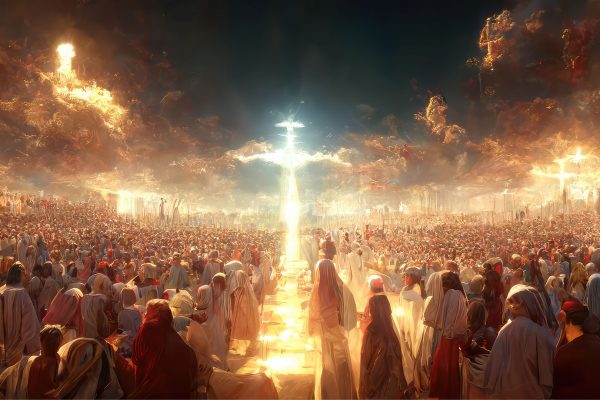Rapture Conflict
Book Review
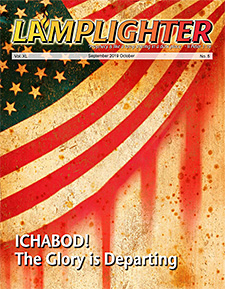
I am sorry to announce that Dr. Michael Brown, whom I highly respect, has recently co-authored a book attacking the concept of a Pre-Tribulation Rapture. His writing partner is Dr. Craig Keener, who is a Professor of Biblical Studies at Asbury Seminary in Wilmore, Kentucky.
A Basic Premise
The book’s title, Not Afraid of the Antichrist, sums up one of their basic arguments against the Pre-Trib Rapture. Basically, what they claim is that those of us who believe in a Pre-Trib Rapture are a bunch of sissies who are unwilling to suffer for the Lord, and therefore, we have deceived ourselves into believing that we will be supernaturally taken out of this world before the Tribulation begins.
This, of course is a classic straw man argument. I know a lot of Bible teachers and professors who believe in a Pre-Trib Rapture, and I cannot think of one whose belief is based on fear of the Antichrist. Instead, their belief is based upon the Bible’s precious promise that at any moment Jesus may return as a Bridegroom to take His Bride, the Church, out of this world (1 Thessalonians 4:13-18). And they believe that the best inference of Scripture is that this event will happen before the Tribulation begins.
In pursuit of their unfounded thesis, the authors spend a lot of their time relating stories of terrible persecution suffered by Christians in places like China and Nigeria. They also devote themselves to quoting verses that assure us that if we truly stand for Jesus, we will suffer persecution. They then ask why true Christians in America should think they will not suffer similar tribulation someday.

A Significant Difference
The answer to their question is that there is a major difference between tribulation (John 16:33) and the Great Tribulation (Revelation 7:14). No one I know of who believes in a Pre-Trib Rapture also believes that Christians are immune to harassment, persecution and even murder. We Christians in the Western world have been blessed to live in relative peace compared to believers in Africa, Asia and Latin America.
But those days are over. Today, throughout Western Europe and all across our nation and Canada, Christians are being marginalized and are encountering increasing persecution. And it is going to increase in frequency and intensity due to the paganization of our culture.
Those of us who believe in a Pre-Trib Rapture fully expect to suffer Satanic persecution from society. But the Bible promises us protection from the eschatological wrath of God — the ultimate type of God’s wrath that God pours out on all the world.
God has exercised that type of wrath once before in the worldwide Noahic Flood. He has promised it once again at the end of the Church Age, in the form of a series of judgments of unparalleled horror that will last for a period of seven years.
Believers have been promised immunity from this type of God’s wrath (1 Thessalonians 1:10). And those of us who believe that promise look forward to a Pre-Tribulation Rapture of the Church. Our hope is based on a promise of Scripture and not a fear of the Antichrist.
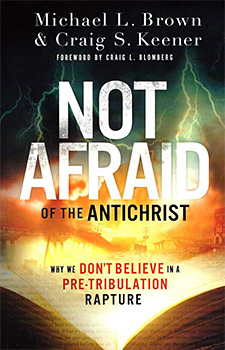
A Second Flimsy Argument
A second theme of this anti-Rapture book is that a belief in a Pre-Trib Rapture is based solely on erroneous teaching and preaching because it could never be arrived at by just studying the Scriptures. Another straw man!
The authors base this allegation on their own experiences. Both grew up in churches that taught the Pre-Trib Rapture, and both came to the conclusion later in life that the concept could not be supported by Scripture.
Well, I have news for them. I grew up in a militantly Amillennial church whose leaders were so dogmatic about their belief that if anyone had the audacity to disagree with them, they were subjected to ridicule. In fact, if they persisted in challenging the Amillennial viewpoint, they were formally disfellowshipped!
I came to a Premillennial understanding of God’s Word through Bible study, and not through teaching and preaching. And in the same manner, I came to the conclusion that the Rapture described in 1 Thessalonians 4 had to be an event separate and apart from the Return of Jesus described in Revelation 19.
Nor am I the only person who has ever come to these conclusions based solely on the study of the Scriptures. In a recent book by Dr. William Watson titled, Dispensationalism Before Darby (2015), he proves that there were many people in the 17th and 18th Centuries who also concluded that the Rapture and Return were two different events separated in time — and some even believed the Rapture would be before the Tribulation.
Dr. Watson concludes that by the beginning of the 19th Century, the belief in a Pre-Trib Rapture “was held not only by Baptists…but also by leading Anglicans…and even by Scottish Presbyterians” (page 262). In other words, It was not just some fanciful concept that popped into the imaginative mind of an English theologian named John Darby in 1830, as the authors claim.
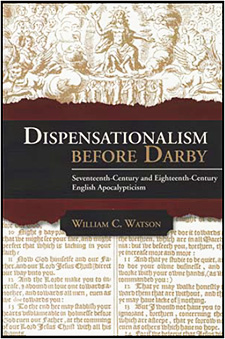
Without Dr. Watson’s detailed evidence, an historian by the name of Dr. Paul Boyer had already come to this conclusion in his book, When Time Shall Be No More: Prophecy Belief in Modern America. This book was published by Harvard University Press in 1994. He wrote:
In a sense, Darby’s system contained nothing new. His focus on the future fulfillment of prophecy followed the eschatology of the early Christians…
Even Rapture doctrine…can be found in the writings of early interpreters…But Darby wove these diverse strands into a tight and cohesive system that he buttressed at every point by copious biblical proof texts, then tirelessly promoted through his writing and preaching tours (page 188).
Another Off-Base Argument
Another of the straw men constructed by Drs. Brown and Keener is that a belief in the Pre-Trib Rapture produces apathetic Christians who are content with sitting on the sidelines waiting for the Lord’s appearing while ignoring evangelism and societal problems.
Nope — I don’t know any of these folks either! In fact, the leading advocate of the Pre-Trib Rapture in recent years — Tim LaHaye — was one of the foremost Christian political activists who was heavily involved with the Moral Majority Movement. And his wife, Beverly, founded Concerned Women of America, a conservative Christian women’s activist group.
The Book’s Biggest Flaw
The greatest weakness of the Brown-Keener book is its handling of imminency. The authors literally dance around the issue, and of course, there is good reason for them doing so.
The Bible makes it clear that the Lord could return any moment and that we as Christians are to live looking for His return. That’s called imminency. But if you reject the Rapture and believe only in what’s called the Second Coming, there is no imminency. That’s because there are so many prophecies that must be fulfilled before the Second Coming can occur. To name only one — there must be seven years of Tribulation!
Those who reject the Rapture in favor of a belief only in the Second Coming are living looking for the Antichrist. Those of us who believe the Rapture is an event separate and apart from the Lord’s return to earth are living looking for Jesus Christ — not the Antichrist.
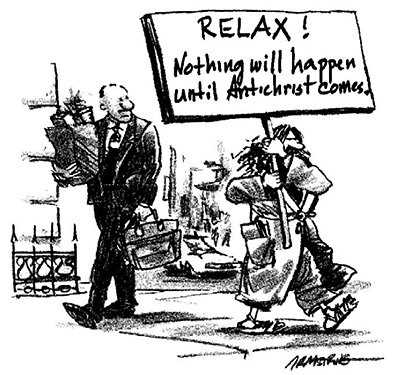
The Authors’ Concept of the Rapture
So, what do the authors do with the Rapture that the Apostle Paul describes in detail in 1 Thessalonians 4? They combine it with the Second Coming. Thus, they argue that when the Lord appears in the heavens, believers will be raptured up to meet Him in the sky and then will immediately return with Him to the earth to reign with Him for a thousand years in the Millennium.
There are many problems with this Post-Trib Rapture concept. For one thing, as I have already pointed out, it destroys imminency.
Another problem is that it does not provide a population for the Millennium. Why? Because if the Rapture and the Second Coming are all one event, then every believer, both Jew and Gentile and both living and dead, will be glorified at the time of the Lord’s return. All others will be consigned to Hades. That means there will no people in mortal bodies to enter the Millennium and repopulate the earth.
This is not a problem with the Pre-Trib Rapture concept, for according to it, all Church Age believers, living and dead, will receive glorified bodies at the time of the Rapture — before the Tribulation begins. Then, during the following seven years of the Tribulation, many people will accept Jesus, and even though most of them will be martyred by the Antichrist, there will be a remnant of both Jewish and Gentile believers who will live to the end of the Tribulation. It is this group that will be allowed to enter the Millennium in the flesh. They will repopulate the earth and those of us in glorified bodies will reign over them.
Again, the Post-Trib Rapture provides no one to reign over during the Millennium.
A Concluding Observation
I will conclude with a quote from one of my favorite Bible prophecy teachers, Dr. Ron Rhodes. Several years ago he was one of the featured speakers at our annual Bible conference. He was asked to speak on the Rapture, and when he got to the point of reviewing the Post-Trib Rapture concept, he began by reminding the audience that the Apostle Paul concluded his description of the Rapture by saying, “Therefore, encourage one another with these words” (1 Thessalonians 4:18).
He then summed up the Post-Trib Rapture concept with these words:
Let’s imagine for a moment that Post-Tribulationism is true. Here’s what this view of the Rapture is saying:
- You will go through the seven years of God’s wrath.
- You will suffer through the terrible reign of the Antichrist.
- You will experience the agonizing Seal, Trumpet and Bowl Judgments — which will grow progressively worse and increasingly painful.
- Most of you will die painful deaths as martyrs.
“Therefore, encourage one another with these words” (1 Thessalonians 4:18). I’m sorry, friends — it just doesn’t work!
All I can say is Amen!



